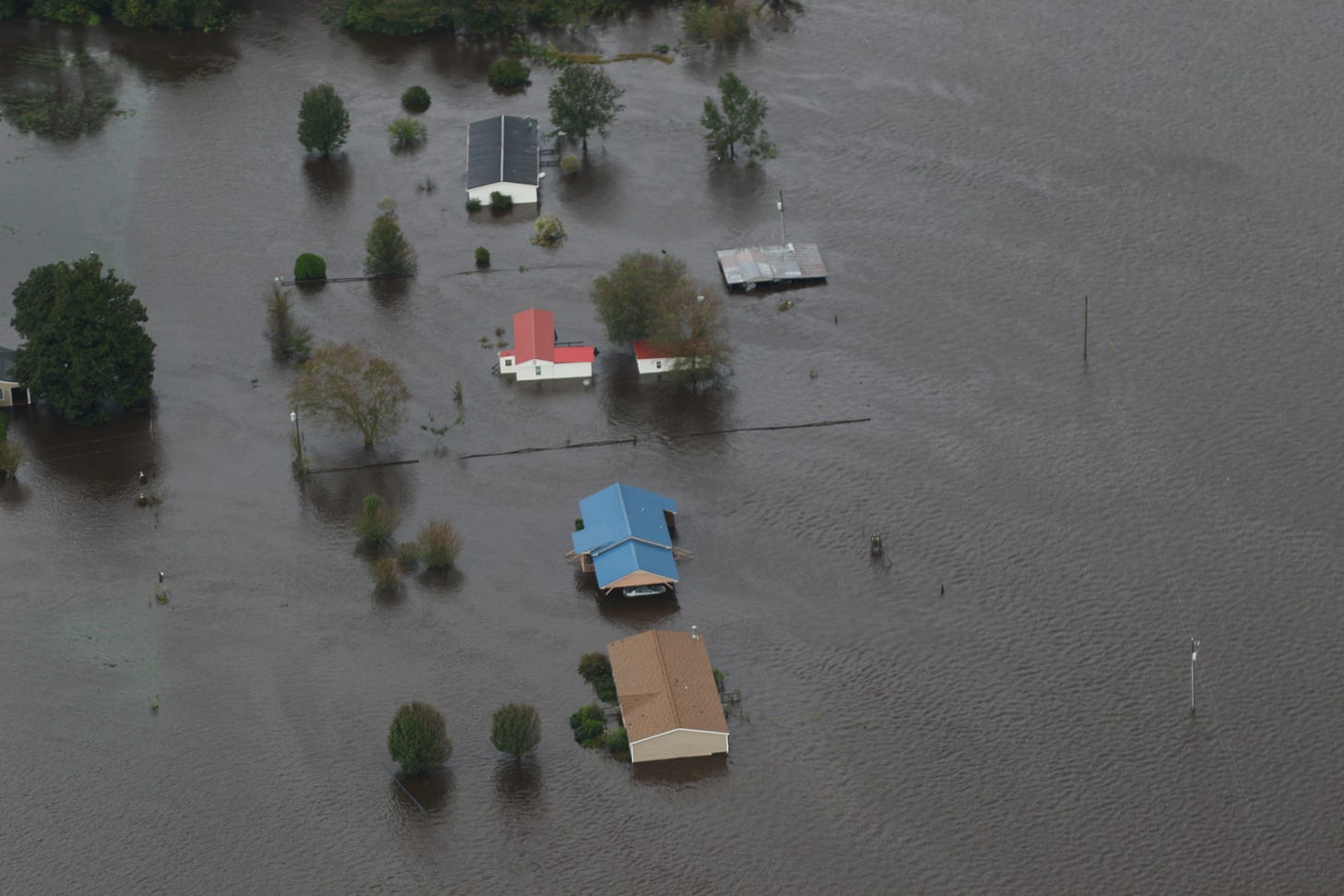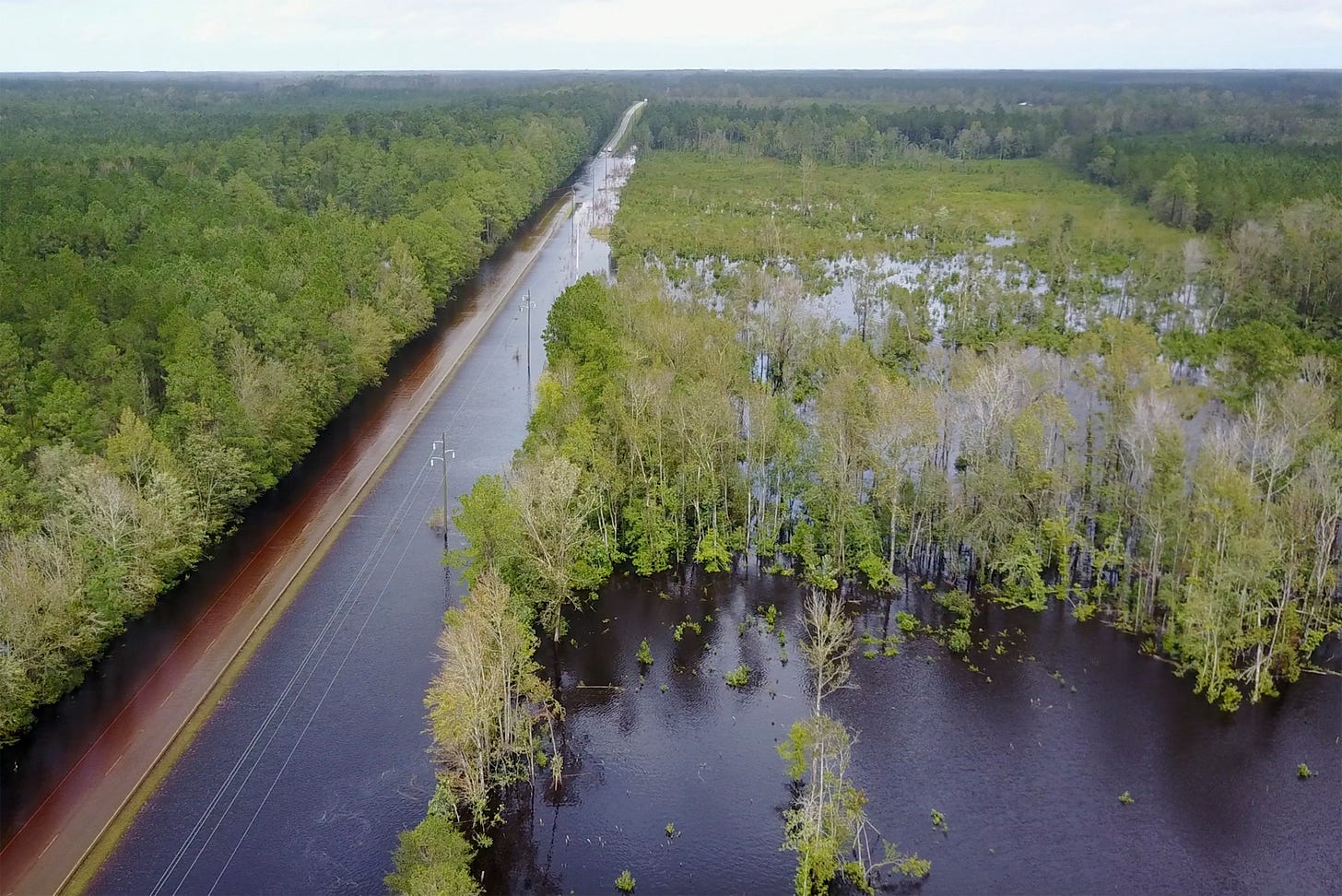When the next storm hits North Carolina, who will pay the price?
A new report on the state’s climate crisis begs the ominous question for communities in harm’s way.
Emily Sanders is the Center for Climate Integrity’s editorial lead. Catch up with her on Twitter here.
Good morning — it’s Friday, and it’s also the 155th aniversary of Juneteenth during a pivotal moment in the fight for racial justice in America. It’s a good day to read Mary Heglar’s powerful words: “We Don’t Have to Halt Climate Action to Fight Racism.”
Friendly reminder that if you haven’t signed up for weekly updates from EXXONKNEWS, you can do so below.
As North Carolina braces for a worse-than-usual Atlantic hurricane season in the middle of an ongoing pandemic, state officials have a new tool to help guide their decision-making this summer and beyond: a report developed by the state’s Department of Environmental Quality on the climate threats facing the Tar Heel state and what measures should be taken towards resilience.
The “Climate Risk Assessment and Resilience Plan,” published this month under an executive order from Governor Roy Cooper, outlines one monumental risk after another: stronger and more frequent hurricanes, floods, sea-level rise, extreme heat, wildfires, drought, and more.
Implementing the state’s recommendations doesn’t come cheap. Hurricanes Matthew (2016) and Florence (2018) resulted in $544 million and $2.4 billion in agricultural losses to the state, respectively. Much of that damage resulted from flooding, which the state’s report identifies as “the most frequent, devastating, and important climate-related hazard to focus upon.” Extreme precipitation costs tens of millions each year in maintenance and repairs. The growing threat of wildfires in western NC requires more equipment upgrades that are estimated to cost $16 million.
These costs don’t even come close to telling the whole story. In fact, they’re just the beginning.
“We’ve got communities in North Carolina that are still struggling to recover from hurricanes that hit two or three years ago, and that have not yet gotten recovery money to get back in their homes and have them repaired,” says Jim Warren, the executive director of local climate justice and clean energy advocacy group NC Warn.
As laid out in the state’s recent report and the scientific study that preceded it, hurricanes like Matthew, Florence, and Dorian won’t be the exception, they’ll be the rule.
Making matters worse, hurricane and flooding damage is compounded by pollution that falls hardest on North Carolina’s Black and Indigenous communities. After Hurricane Florence struck, pollutants like agricultural waste, spills from chemical and toxic waste facilities, and carcinogenic coal ash flooded from overflowing rivers into the streets while people struggled to evacuate their homes.
These small towns and rural communities across the state that experience the most flooding are also far less likely to be equipped with the resources necessary to keep themselves safe.
Today, many of the communities that are hardest hit by climate change — like members of the Lumbee tribe, the state’s largest Native community — also sit in the path of the planned 600-mile gas Atlantic Coast Pipeline.
A federal appeals court decision halted its construction in 2018. But just this week, that ruling was reversed by the U.S. Supreme Court.
Donna Chavis, the senior fossil fuels campaigner of environmental advocacy group Friends of the Earth and a member of the Lumbee tribe, says methane emissions and leaks from the pipeline will be a large contributor to the climate crisis directly — and that the infrastructure also disrupts land and waterways, making impacts like flooding even harder to avoid.
“The elders especially, who know the patterns of water in the areas, strongly believe that the pipes are related to the flooding that happened during Hurricanes Matthew and Florence,” says Chavis. “We had flooding with Florence that was inland in ways that had not happened before.”
The pipeline is planned to run through a stretch of North Carolina where communities have been battered time and again by devastating storms. Those counties, including Robeson, where Chavis lives, are also among the poorest in the state, and the home of large Black, Indigenous, and Latinx communities.
“We still have people who have not gotten back into their homes after Hurricane Matthew, which was four years ago. They had a one-two punch: just as they had repaired their homes from Matthew, Florence came, and in between there were smaller storms,” says Chavis, who has seen intense flooding from heavy rains just over the past week. “The ground is so saturated that flooding has been almost nonstop since Florence.”
Just this week, flooding of the Tar River after heavy rains in northeast North Carolina reached the third highest level on record.
These disasters have effects that ripple through the community for years, Chavis said, from disrupting families and businesses to making it harder for people to vote.
In 2018, NC Warn and Friends of the Earth joined forces to file a lawsuit against Duke Energy, the state’s electricity monopoly that owns nearly half of the Atlantic Coast Pipeline, for using its unfair utility rate hikes to pay for lobbying and false advertising. NC Warn estimates Duke spent more than $80 million a year on their own Exxon-like deception campaign, painting natural gas projects like the Atlantic Coast Pipeline as essential to the state while kneecapping the development of renewable energy.
Warren and Chavis said that they would welcome and support legal efforts to hold leading fossil fuel companies accountable for their own bait and switch. “It’s not any different from what was done with the tobacco companies — it’s already been proven that the energy companies knew what they were doing,” Chavis said. “I believe that we’re all responsible for our actions, and I don’t believe that corporations should be any different.”
Want more about holding oil and gas executives accountable for climate change in North Carolina? Read Mike Meno, the Center for Climate Integrity’s press secretary, in Cardinal & Pine on why Big Oil should pay for North Carolina’s climate costs.
ICYMI News Roundup



